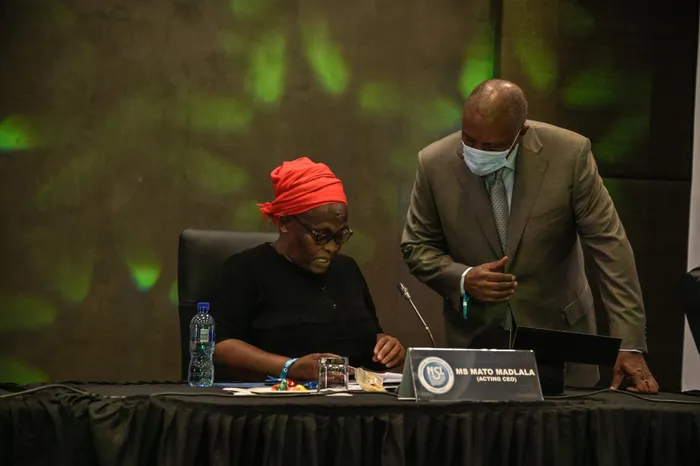COMMENT | Davind Thidiela’s impassioned call for accountability amidst PSL leadership's conflict of interest
COMMENT

Mato Madlala, longest serving acting PSL CEO and the organisation's chairperson Irvin Khoza during an NSL BoG meeting. | BackpagePix
Image: BackpagePix
In a bold declaration that resonates throughout the corridors of South African football, David Thidiela, the controversial owner of Black Leopards FC, has issued a resounding call for accountability within the Premier Soccer League (PSL).
He has painted a stark picture of conflict of interest involving PSL chairperson Irvin Khoza and longtime acting CEO Mato Madlala, the owners of Orlando Pirates and Lamontville Golden Arrows, respectively. Thidiela argues that their dual roles undermine the integrity of the league and violate the principles of corporate governance.
The accusations Thidiela has made on more than one occasion hinge on several crucial points; Khoza and Madlala, as owners of their clubs, are directly involved in critical discussions regarding sponsorships, fixture decisions, and more, which can severely disadvantage other clubs within the league.
By spotlighting the ethical quagmire that plagues South African football governance, Thidiela questioned the impartiality of officials who are supposed to provide oversight while also being owners. Thidiela’s sentiments echo those of fellow club owner John Comitis, who has previously advocated the appointment of neutral officials to lead the PSL.
Comitis has previously voiced that the current structure fails to ensure fairness for all member clubs, as officials who are also club owners possess an inherent bias.
As if deepening the crisis, Thidiela has pointed out potential violations of FIFA’s Code of Ethics (FCE). While the regulations do not explicitly bar club owners from holding governance roles, they require the immediate disclosure of conflicts and, where they exist, recusal from decision-making.
Thidiela is increasingly concerned that the current situation may see decisions influenced by personal interests rather than the overall improvement of the league.
Despite the growing criticism, Khoza has thus far avoided inquiries regarding these conflicts. He has maintained that the PSL is managed by an executive committee of 10 members, along with a board of governors representing all 32 clubs.
However, detractors, including Thidiela and Comitis, remain unconvinced, arguing that these measures are inadequate to address the core governance issues.
The ramifications of continuing this pattern of governance are profound. Many clubs struggle to secure sponsorships, and the PSL’s monthly grant serves as a lifeline for some owners amid financial instability.
The presence of conflicting interests has long been considered a ticking time bomb. Observers caution that inaction may threaten the professionalism and future of South African football.
This pervasive atmosphere of unrest calls not only for immediate dialogue but a thorough re-evaluation of the PSL’s governance structures.
The question remains: how long will the football community tolerate an environment that, rather than promoting fair competition, thrives on accountability issues and personal interests?
Related Topics: